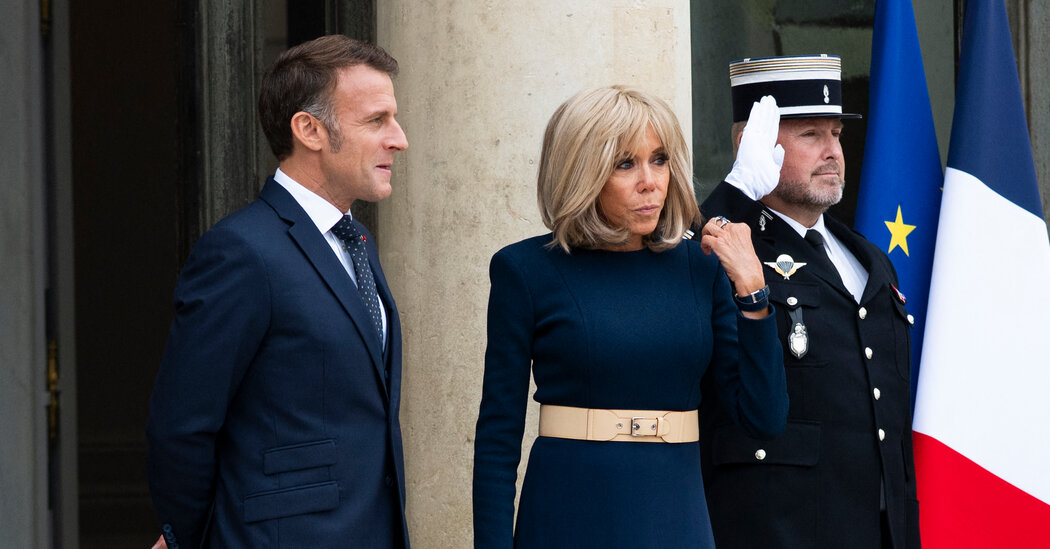The relationship of President Emmanuel Macron of France and his wife, Brigitte, has long been subjected to intense scrutiny. Now, 10 people accused of online harassment of the first lady are on trial in Paris, charged with spreading false claims about their marriage and her gender.
Ms. Macron, 72, filed a complaint last year after messages and photos spread on social media suggesting that she was a transgender woman who was born a man called Jean-Michel Trogneux, the name of her older brother.
The claims gained traction in the United States last year, after Candace Owens, an American right-wing podcaster with a large social media following, repeated them. In July, the Macrons filed a separate defamation suit against Ms. Owens in Delaware.
The trial of the eight men and two women accused of spreading “malicious comments” about Ms. Macron began this week. The office of the Paris prosecutor said that some of the comments portrayed the 24-year age difference between her and the president as “pedophilia.”
The defendants played down their role, saying that they had small social media followings and that they were participating in a legitimate public debate or being satirical.
Ms. Macron has not appeared at the trial. But she told the police that the online comments were “hateful,” and that they had had a devastating effect on her grandchildren, according to a statement read out in court on Monday.
On Tuesday, Ms. Macron’s youngest daughter, Tiphaine Auzière, testified in court that she had seen a change in her mother in the wake of the claims. The first lady is now forced to pay close attention to the way she dresses and poses in public, Ms. Auzière said, because “she knows her image can be distorted to promote lies and fallacious theories.”
“Not a week goes by without someone talking to her about it,” she said. “As a girl, a woman and a mother, I wouldn’t wish what she’s going through on anyone.”
Here’s what to know about the case.
What’s behind the legal fight?
Mr. Macron and his wife first met when he was 15 and she was a teacher at his secondary school in Amiens, in the north of France, and married with three children.
In 2021, Delphine Jegousse, a self-described psychic, published a video in which some of the claims about Ms. Macron were first made. A year later, Ms. Macron and her brother sued Ms. Jegousse and Nathalie Rey, another woman featured in the video.
In 2024, the women were found guilty of slander. But in July, a court overturned that decision on appeal and ruled that the false claims had been made in “good faith.” Ms. Macron and her brother have appealed the decision to France’s highest court.
Though Ms. Macron and her husband have decided to take legal action in France and the United States, they have rarely commented on the claims in public.
In January 2022, Ms. Macron said in a French radio interview: “At some point I realized that they were changing my genealogy.” If she did not respond in the courts, she said, her efforts to push back against harassment against children would be tarnished.
Last year, during a ceremony to celebrate the decision to enshrine access to abortion in the French Constitution, the president told reporters that those propagating claims about his wife’s identity were “nutters.”
“The worst thing is false information and fabricated scenarios, with people who end up believing them and disrupting your life, including your privacy,” he said.
In an interview with the police in December 2024, Ms. Macron said: “I think they’re using me to get to him, that’s how I feel. I have never been abroad without someone mentioning it to me. There is not a single spouse of a head of state who is not aware of it.”
“All these allegations have had a strong impact” on those closest to her, she said in the police interview, which was read out in court on Monday.
How are the accused defending themselves?
On the first day of the trial, the defendants who testified said that their role was minor in spreading the information, given that they do not have large social media followings. They said they had meant no harm.
They also insisted that the conjecture over Ms. Macron’s identity and the nature of the couple’s relationship was legitimate, because they are public figures. Most of their posts on social media were reposts of information published by others, such as Ms. Owens, and were intended to be sarcastic, they said.
“It’s a joke, it’s funny,” said Jérôme Claverie, a 53-year-old man from southern France who works in finance of his social media posts. “Do you need a certificate or diploma to make jokes in France?”
He said: “There is something weird in this story, I’m allowed to have questions.”
Another defendant, Jérôme Amiot, a 49-year-old tech worker, said he did not understand why he was in court. “Today you can send people to court for a few tweets,” he said. “It’s scary.”
He said the Macrons could have killed the story by presenting evidence to refute the claims.
Last month, Tom Clare, the lawyer representing the Macrons in the United States, told the BBC that his clients would be willing to present scientific evidence that Ms. Macron was a woman in their case against Ms. Owens.
Another defendant in the French case, Jean-Christophe Denoual, a 54-year-old physical education teacher, said that he was “stunned to read that Ms. Macron may have suffered from my tweets,” but that the trial felt “disproportionate.”
“Of course I apologize if I caused her any harm, I regret it,” he said.
In his closing arguments, the prosecutor singled out three defendants who had large social media followings, saying that they should be subjected to harsher punishment: Ms. Jegousse, 51; a former publicist turned novelist named Aurélien Poirson-Atlan, 41, who posted on social media under a pseudonym and had tens of thousands of followers before the account was disabled; and Bertrand Scholler, 56, the owner of an art gallery in Paris. They all denied wrongdoing.
Mr. Poirson-Atlan and Mr. Scholler warned that the case could set a dangerous precedent. “We live in a country where up until recently we had a right to demonstrate freely,” said Mr. Scholler. “How far is this going to go?”
What happens next?
The court in Paris will have to determine if messages posted online by the accused caused a deterioration of Ms. Macron’s “living conditions, leading to an impairment of her physical or mental health.”
It was unclear when the court would issue a verdict, but lawyers involved in the case said it could take up to eight weeks. If the accused are found guilty, they could be jailed for up to two years and fined 30,000 euros, or about $35,000.
Ségolène Le Stradic is a reporter and researcher covering France.
The post 10 Accused of Cyberbullying France’s First Lady Stand Trial. Here’s What to Know. appeared first on New York Times.




